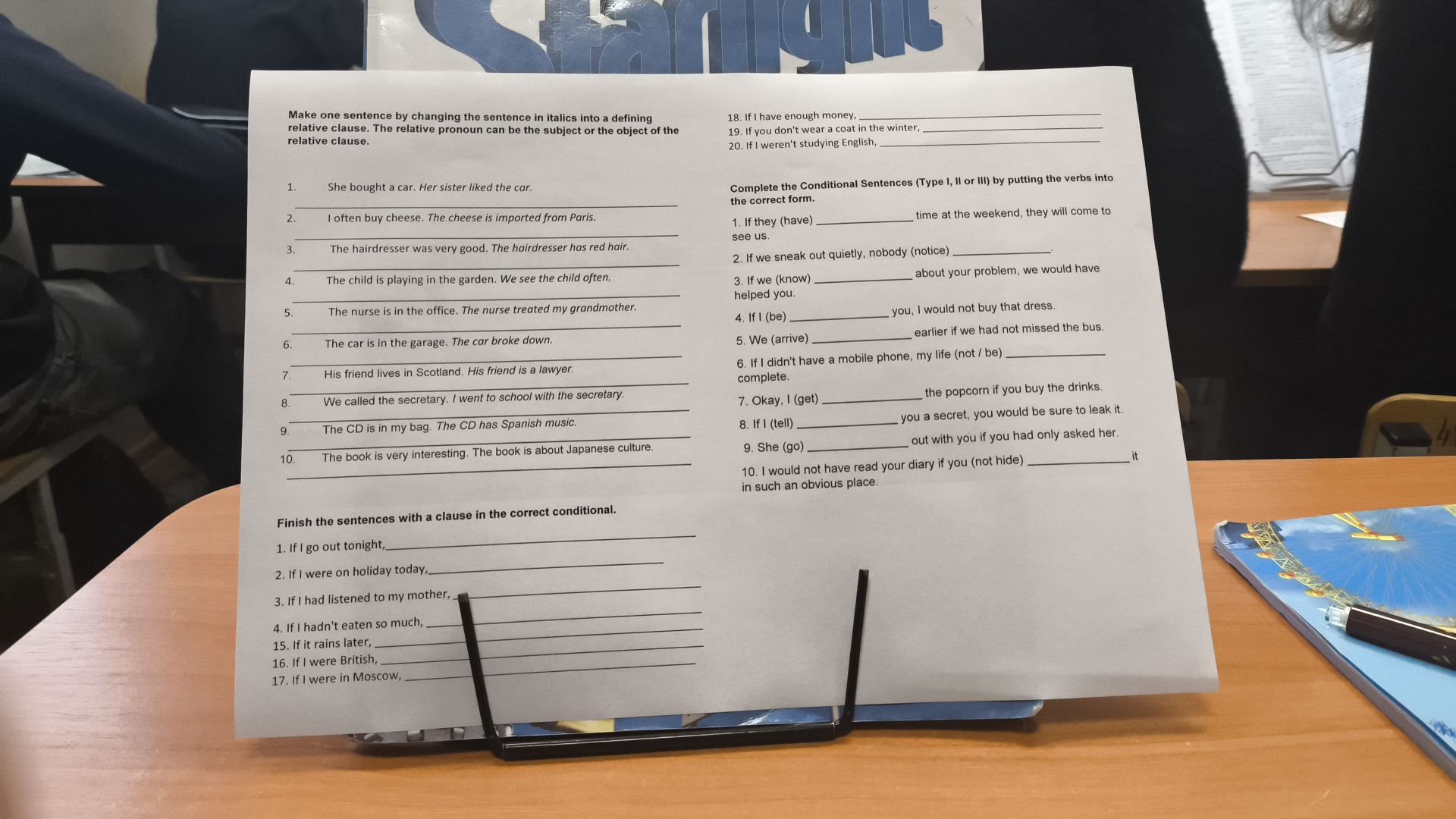
Вопрос:
Finish the sentences with a clause in the correct conditional. 15. If it rains later,
Ответ:
If it rains later, I will stay at home.
Похожие
- Make one sentence by changing the sentence in italics into a defining relative clause. The relative pronoun can be the subject or the object of the relative clause. 1. She bought a car. Her sister liked the car.
- Make one sentence by changing the sentence in italics into a defining relative clause. The relative pronoun can be the subject or the object of the relative clause. 2. I often buy cheese. The cheese is imported from Paris.
- Make one sentence by changing the sentence in italics into a defining relative clause. The relative pronoun can be the subject or the object of the relative clause. 3. The hairdresser was very good. The hairdresser has red hair.
- Make one sentence by changing the sentence in italics into a defining relative clause. The relative pronoun can be the subject or the object of the relative clause. 4. The child is playing in the garden. We see the child often.
- Make one sentence by changing the sentence in italics into a defining relative clause. The relative pronoun can be the subject or the object of the relative clause. 5. The nurse is in the office. The nurse treated my grandmother.
- Make one sentence by changing the sentence in italics into a defining relative clause. The relative pronoun can be the subject or the object of the relative clause. 6. The car is in the garage. The car broke down.
- Make one sentence by changing the sentence in italics into a defining relative clause. The relative pronoun can be the subject or the object of the relative clause. 7. His friend lives in Scotland. His friend is a lawyer.
- Make one sentence by changing the sentence in italics into a defining relative clause. The relative pronoun can be the subject or the object of the relative clause. 8. We called the secretary. I went to school with the secretary.
- Make one sentence by changing the sentence in italics into a defining relative clause. The relative pronoun can be the subject or the object of the relative clause. 9. The CD is in my bag. The CD has Spanish music.
- Make one sentence by changing the sentence in italics into a defining relative clause. The relative pronoun can be the subject or the object of the relative clause. 10. The book is very interesting. The book is about Japanese culture.
- Complete the Conditional Sentences (Type I, II or III) by putting the verbs into the correct form. 1. If they (have) time at the weekend, they will come to see us.
- Complete the Conditional Sentences (Type I, II or III) by putting the verbs into the correct form. 2. If we sneak out quietly, nobody (notice) about your problem, we would have helped you.
- Complete the Conditional Sentences (Type I, II or III) by putting the verbs into the correct form. 3. If we (know) about your problem, we would have helped you.
- Complete the Conditional Sentences (Type I, II or III) by putting the verbs into the correct form. 4. If I (be) you, I would not buy that dress.
- Complete the Conditional Sentences (Type I, II or III) by putting the verbs into the correct form. 5. We (arrive) earlier if we had not missed the bus.
- Complete the Conditional Sentences (Type I, II or III) by putting the verbs into the correct form. 6. If I didn't have a mobile phone, my life (not/ be) complete.
- Complete the Conditional Sentences (Type I, II or III) by putting the verbs into the correct form. 7. Okay, I (get) the popcorn if you buy the drinks.
- Complete the Conditional Sentences (Type I, II or III) by putting the verbs into the correct form. 8. If I (tell) you a secret, you would be sure to leak it.
- Complete the Conditional Sentences (Type I, II or III) by putting the verbs into the correct form. 9. She (go) out with you if you had only asked her.
- Complete the Conditional Sentences (Type I, II or III) by putting the verbs into the correct form. 10. I would not have read your diary if you (not hide) it in such an obvious place.
- Finish the sentences with a clause in the correct conditional. 1. If I go out tonight,
- Finish the sentences with a clause in the correct conditional. 2. If I were on holiday today,
- Finish the sentences with a clause in the correct conditional. 3. If I had listened to my mother,
- Finish the sentences with a clause in the correct conditional. 4. If I hadn't eaten so much,
- Finish the sentences with a clause in the correct conditional. 15. If it rains later,
- Finish the sentences with a clause in the correct conditional. 16. If I were British,
- Finish the sentences with a clause in the correct conditional. 17. If I were in Moscow,